Alberta
Danielle Smith slams Trudeau’s carbon tax exemption for Atlantic Canada and not rest of country
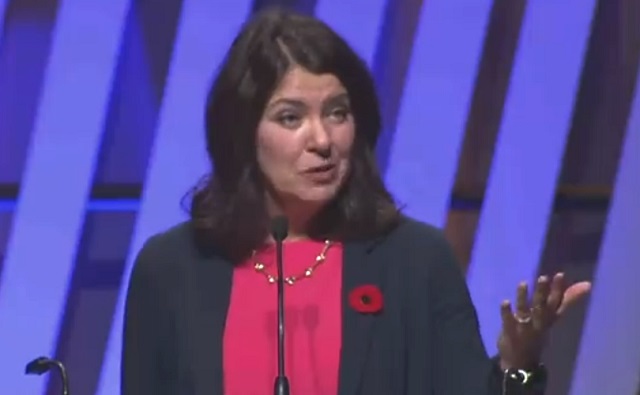
From LifeSiteNews
‘As a Canadian, do you feel it is fair to continue paying the carbon tax on home heating when some places are now exempt?’ the Alberta premier asked.
Alberta Premier Danielle Smith chided Prime Minister Justin Trudeau as being unfair in not applying “tax fairness” for Albertans and all Canadians after Trudeau announced a pause on the carbon tax for home heating oil but only for Atlantic Canada.
“If you’re going to have a federal government asserting that they have to have this power so that everybody is treated equally, then they don’t treat everyone equally. It seems to me that that’s something that should go back to the court and ask them whether or not they want to reconsider whether this is an appropriate use of the federal powers,” Smith said recently at a press conference.
“I would rather the federal government accept that if this is a painful tax coming into winter for Atlantic Canadians, it’s a painful tax going into the winter for everyone and just make sure that he does the right thing and takes the tax off for all types of home heating and every province,” Smith said.
As a Canadian, do you feel it is fair to continue paying the carbon tax on home heating when some places are now exempt?
Comment below 👇 pic.twitter.com/9jHEp9cFpK
— Danielle Smith (@ABDanielleSmith) November 2, 2023
Smith has been fighting a prolonged battle with the Liberal federal government of Trudeau, who has gone on the attack against Alberta’s oil and gas industry through the implementation of ideologically charged laws, including the punitive carbon tax.
Trudeau, however, has given breaks to some parts of the country on the carbon tax for home heating fuels but not others.
He recently announced that he was pausing the collection of the carbon tax on home heating oil in for three years, but only for Atlantic Canadian provinces. The current cost of the carbon tax on home heating fuel is 17 cents per litre. Most Canadians, however, heat their homes with clean-burning natural gas, a fuel that will not be exempted from the carbon tax.
Trudeau’s announcement came amid dismal polling numbers showing his government will be defeated in a landslide by the Conservative Party come the next election.
This resulted in federal Conservative Party (CPC) leader Pierre Poilievre daring Trudeau to call a “carbon tax” election so Canadians can decide for themselves if they want a government for or against a tax that has caused home heating bills to double in some provinces.
Recent political challenges against the carbon tax have failed. Recently, a CPC motion calling for the carbon tax to be paused for all Canadians failed to pass after the Liberal and Bloc Quebecois MPs voted against it. This motion interestingly had support from the New Democratic Party (NDP) but that was not enough to get it passed.
Canadian premiers come together to demand carbon tax pause for all provinces
Trudeau’s latest offering of a three-year pause on the carbon tax in Atlantic Canada has caused a major rift with oil and gas-rich western provinces, notably Alberta and Saskatchewan, and even Manitoba, which has a new NDP government.
This prompted all premiers of Canada to come together to call on the Trudeau government to extend the carbon tax fuel pause to all Canadians.
“All this is doing is causing unfairness, making life less affordable, and really harming the most vulnerable as we get into the winter season,” Smith said today about most provinces being left out of the carbon tax pause.
Going one step further, on November 10, Five Canadian premiers from coast to coast banded together to demand Trudeau drop the carbon tax for home heating for all Canadian provinces, saying his policy of giving one region a tax break over another have caused “divisions” in Canada.
After Trudeau announced a special tax break for Atlantic Canada, Saskatchewan Premier Scott Moe said his province will stop collecting a federal carbon tax on natural gas used to heat homes on January 1, 2024, unless it gets a similar tax break as the Atlantic Canadian provinces.
Alberta has repeatedly promised to place the interests of their people above the Trudeau government’s “unconstitutional” demands while consistently reminding the federal government that their infrastructures and economies depend upon oil, gas, and coal.
As for Smith has fought back, and recently tore a page off a heckler’s fantasy suggestion of a solar and wind battery-powered future after she stepped into the lion’s den to advocate for oil and gas at a conference hosted by a pro-climate change think tank.
Smith has said she will be looking into whether a Supreme Court challenge on the carbon tax is in order. She noted, however, that as Alberta has a deregulated energy industry, unlike Saskatchewan, she is not able to stop collecting the federal carbon tax.
The Trudeau government’s current environmental goals – in lockstep with the United Nations’ “2030 Agenda for Sustainable Development” – include phasing out coal-fired power plants, reducing fertilizer usage, and curbing natural gas use over the coming decades.
The reduction and eventual elimination of the use of so-called “fossil fuels” and a transition to unreliable “green” energy has also been pushed by the World Economic Forum (WEF) – the globalist group behind the socialist “Great Reset” agenda – an organization in which Trudeau and some of his cabinet are involved.
The Trudeau government has also defied a recent Supreme Court ruling and will push ahead with its net-zero emission regulations.
Canada’s Supreme Court recently ruled that the federal government’s “no more pipelines” legislation is mostly unconstitutional after a long legal battle with the province of Alberta, where the Conservative government opposes the radical climate change agenda.
Alberta
It’s On! Alberta Challenging Liberals Unconstitutional and Destructive Net-Zero Legislation
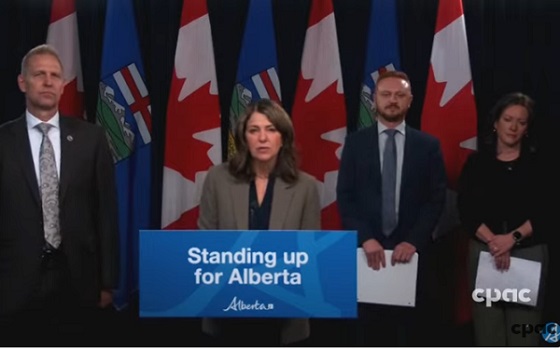
“If Ottawa had it’s way Albertans would be left to freeze in the dark”
The ineffective federal net-zero electricity regulations will not reduce emissions or benefit Albertans but will increase costs and lead to supply shortages.
The risk of power outages during a hot summer or the depths of harsh winter cold snaps, are not unrealistic outcomes if these regulations are implemented. According to the Alberta Electric System Operator’s analysis, the regulations in question would make Alberta’s electricity system more than 100 times less reliable than the province’s supply adequacy standard. Albertans expect their electricity to remain affordable and reliable, but implementation of these regulations could increase costs by a staggering 35 per cent.
Canada’s constitution is clear. Provinces have exclusive jurisdiction over the development, conservation and management of sites and facilities in the province for the generation and production of electrical energy. That is why Alberta’s government is referring the constitutionality of the federal government’s recent net-zero electricity regulations to the Court of Appeal of Alberta.
“The federal government refused to work collaboratively or listen to Canadians while developing these regulations. The results are ineffective, unachievable and irresponsible, and place Albertans’ livelihoods – and more importantly, lives – at significant risk. Our government will not accept unconstitutional net-zero regulations that leave Albertans vulnerable to blackouts in the middle of summer and winter when they need electricity the most.”
“The introduction of the Clean Electricity Regulations in Alberta by the federal government is another example of dangerous federal overreach. These regulations will create unpredictable power outages in the months when Albertans need reliable energy the most. They will also cause power prices to soar in Alberta, which will hit our vulnerable the hardest.”
Finalized in December 2024, the federal electricity regulations impose strict carbon limits on fossil fuel power, in an attempt to force a net-zero grid, an unachievable target given current technology and infrastructure. The reliance on unproven technologies makes it almost impossible to operate natural gas plants without costly upgrades, threatening investment, grid reliability, and Alberta’s energy security.
“Ottawa’s electricity regulations will leave Albertans in the dark. They aren’t about reducing emissions – they are unconstitutional, ideological activist policies based on standards that can’t be met and technology that doesn’t exist. It will drive away investment and punish businesses, provinces and families for using natural gas for reliable, dispatchable power. We will not put families at risk from safety and affordability impacts – rationing power during the coldest days of the year – and we will continue to stand up for Albertans.”
“Albertans depend on electricity to provide for their families, power their businesses and pursue their dreams. The federal government’s Clean Electricity Regulations threaten both the affordability and reliability of our power grid, and we will not stand by as these regulations put the well-being of Albertans at risk.”
Related information
- Conference Board of Canada socio-economic Impacts of Canada’s 2030 Emissions Reduction Plan – (April 2025)
- Alberta Electric System Operator’s position on Canadian Energy Regulations
Alberta
Alberta’s future in Canada depends on Carney’s greatest fear: Trump or Climate Change
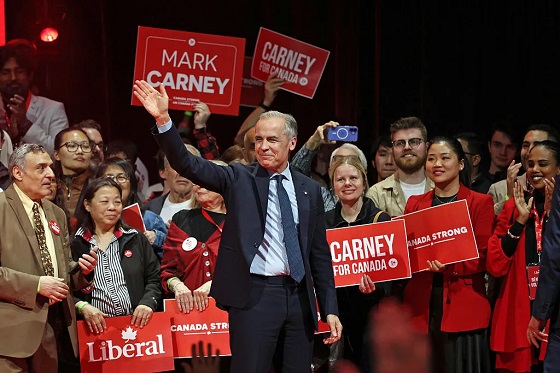
Oh, Canada
We find it endlessly fascinating that most Canadians believe they live in a representative democracy, where aspiring candidates engage in authentic politicking to earn their place in office. So accustomed are Canada’s power brokers to getting their way, they rarely bother to cover their tracks. A careful reading of the notoriously pliant Canadian press makes anticipating future events in the country surprisingly straightforward.
Back in December, when Pierre Poilievre was given better than 90% odds of replacing Prime Minister Justin Trudeau—and Mark Carney was still just an uncharismatic banker few had heard of—we engaged in some not-so-speculative dot-connecting and correctly predicted Carney’s rise to the top spot. Our interest was driven by the notoriously rocky relationship between Ottawa and the Province of Alberta, home to one of the world’s largest hydrocarbon reserves, and how Carney’s rise might be a catalyst for resetting Canada’s energy trajectory. In a follow-up article titled “The Fix Is In,” we laid out a few more predictions:
“Here’s how the play is likely to unfold in the weeks and months ahead: Carney will be elected Prime Minister on April 28 by a comfortable margin; [Alberta Premier Danielle] Smith will trigger a constitutional crisis, providing cover for Carney to strike a grand bargain that finally resolves longstanding tensions between the provinces and Ottawa; and large infrastructure permitting reform will fall into place. Protests against these developments will be surprisingly muted, and those who do take to the streets will be largely ignored by the media. The entire effort will be wrapped in a thicket of patriotism, with Trump portrayed as a threat even greater than climate change itself. References to carbon emissions will slowly fade…
In parallel, we expect Trump and Carney to swiftly strike a favorable deal on tariffs, padding the latter’s bona fides just as his political capital will be most needed.”
The votes have barely been counted, yet the next moves are already unfolding…
“Alberta Premier Danielle Smith says she’ll make it easier for citizens to initiate a referendum on the province’s future in Canada, after warning that a Liberal win in Monday’s election could spur a groundswell of support for Alberta separatism. Smith said on Tuesday that a newly tabled elections bill will give everyday Albertans a bigger say in the province’s affairs.
‘(We’re giving) Albertans more ways to be directly involved in democracy, and to have their say on issues that matter to them,’ Smith told reporters in Edmonton.
If passed, the new law would dramatically lower the number of signatures needed to put a citizen-proposed constitutional referendum question on the ballot, setting a new threshold of 10 per cent of general election turnout — or just over 175,000, based on Alberta’s last provincial election in 2023.”
“US President Donald Trump said on Wednesday that Canadian Prime Minister Mark Carney is looking to make a trade deal and will visit the White House within the next week. Trump said he congratulated Carney on his election victory when the Canadian leader called on Tuesday.
‘He called me up yesterday – he said let’s make a deal,’ Trump told reporters at the White House after a televised Cabinet meeting.”
Remember where you read it first.
-
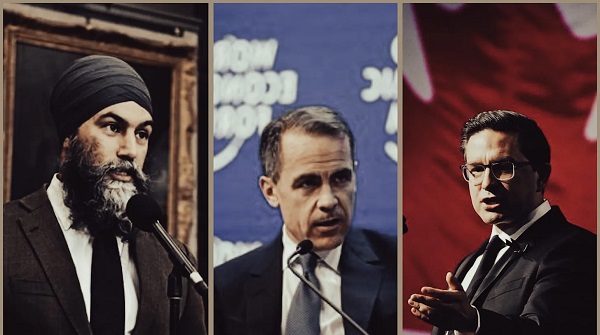
 2025 Federal Election2 days ago
2025 Federal Election2 days agoNDP Floor Crossers May Give Carney A Majority
-

 espionage2 days ago
espionage2 days agoLongtime Liberal MP Warns of Existential Threat to Canada, Suggests Trump’s ’51st State’ Jibes Boosted Carney
-

 Business2 days ago
Business2 days agoLosses Could Reach Nearly One Billion: When Genius Failed…..Again
-

 Bjorn Lomborg2 days ago
Bjorn Lomborg2 days agoHow Canada Can Respond to Climate Change Smartly
-

 Alberta2 days ago
Alberta2 days agoPreston Manning: Canada is in a unity crisis
-
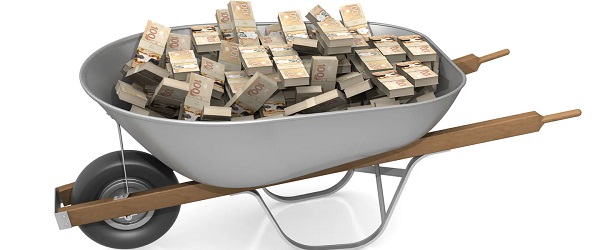
 Automotive2 days ago
Automotive2 days agoNew federal government should pull the plug on Canada’s EV revolution
-
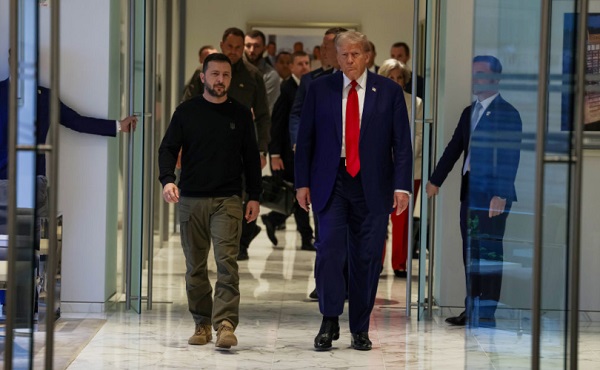
 Business2 days ago
Business2 days agoScott Bessent says U.S., Ukraine “ready to sign” rare earths deal
-

 Business2 days ago
Business2 days agoNew federal government plans to run larger deficits and borrow more money than predecessor’s plan







